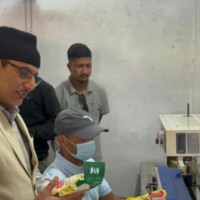- Monday, 1 September 2025
Exceptionalism Rides Inequality
So, the United States has doubled the tariff to 50 per cent on Indian goods effective from August 27. US President Donald Trump wants India to stop buying Russian oil and presses the South Asian power to also throw open the market for the farm and dairy sectors. Intolerant of sovereign nations that assert their options, the American president has the habit of reacting sharply and fast with arm-twisting tactics that have so far worked to a large extent. The approach is unlikely to bear long-term fruit, though.
Instead, the adversely affected bear an incentive to quick thinking for alternative avenues that offer unhindered supply chains and easier access to export markets. The war in Ukraine, in its very first year in 2022, provided a glimpse of how big powers can wield their options ruthlessly.
Trump threatened to raise tariffs on Indian goods if the Narendra Modi government continued importing Russian oil that enabled Moscow to finance the war in Ukraine. Few in the American intelligentsia and political class decried their president’s unthoughtful acts. Modi had held his patience with the world's No. 1 superpower and the largest economy. Eventually, New Delhi put its foot down. New Delhi reminded that the US and Europe were in the thick of importing the very commodity they wanted India to ban. Their import bill involved billions of dollars.
Talkback
Chinese ambassador to India Xu Feihong described the US tariff hike as the work of a “bully”. He said: “Using tariffs as a weapon to suppress other countries violates the UN Charter, undermines WTO rules and is both unpopular and unsustainable.”
American economists have pocketed the largest number of Nobel Prizes. Interestingly, no Chinese person has won a Nobel Prize for Economics. Yet the communist superpower country’s noble feature is its current No. 2 status in the list of the world’s biggest economies. In fact, the US-dominated World Bank and the International Monetary Fund assess that the oldest existing communist country of 1.4 billion population is to take the richest country’s slot well within the next decade.
Washington held no discourse, no decent warning, nor any reasonable deadline for preparations and amicable adjustments before the tariff hike. Trump’s either-in-or-either-out policy was too overbearing, and it finally dawned on the Modi government that butter does not hold in a straight finger.
Leaders in Moscow and Beijing tried to emphasise with New Delhi, even with we-told-you-so glances. The superpower duo had long projected Washington as intensely intolerant of forces that stood to differ with Washington’s wishes. No one gives anything for free. India should know that. Its immediate neighbours do. The US and its close allies are experienced on this score. All countries dealing with economic and military powers have firsthand accounts in such respects.
Ukraine’s President Volodymyr Zelenskyy could corroborate what many others have been saying for a long time. He was seduced into seeking the NATO defence alliance—a move that was bound to provoke Russia’s red line. He is now reduced to begging his original backers for an “acceptable” peace deal with Moscow. Ukraine’s war debts have reached more than $200 billion. Trump extracted on his terms a deal with Zelenskyy for vital natural resources. That was the price for US loans exceeding $100 billion, though Trump claims twice that sum.
The world has undergone sea changes on the economic, technological and defence fronts. More countries are better-equipped than at any time before, and spend more on defence pursuits, including in weapons development and manufacturing. As an end result, others want to be active participants in setting international agendas and enforcing global obligations. In other words, they are no longer prepared to automatically endorse what the mainstream Western capitalist community proposes.
French President Emmanuel Macron, right from the time he was sworn into office in 2017, called for Europe’s “strategic autonomy’’. Angela Merkel, when serving as German chancellor, had aired similar views. Friedrich Merz, the current Chancellor in Germany, wants Europe to “achieve independence” from America on defence issues.
Wars are organised violence, though wrapped in lofty ideals dished out in lip service. Advanced technology does not necessarily produce an advanced civilisation. It cannot even guarantee an existing civilisation the safety and security required for preventing its disintegration. In fact, it risks turning into a monster, missing the heart and soul of humanity. The imperial sphere recognises spheres of influence for regional and subregional or even bilateral ties in arrangements, often at the expense of weaker states whose agendas are rarely addressed fully.
Welcome multipolarity
Washington has asserted its role in setting the global agenda far too often and too deeply. The approach often worked, with occasional adjustments or strategic amendments. Last fortnight, Trump told visiting South Korean President Lee Jae Myung that he would like to meet President Kim Jong Un of the Democratic People’s Republic of Korea in an “appropriate future”. He claimed a “very good” relationship with the communist leader.
When Trump held talks with Kim during his first term in 2018, he became the first sitting president of the US to enter North Korea. He described the event as an “honour”. In the 1950-53 Korean War, the US was directly involved to help “unify” the Korean peninsula and free it from communist takeover. But it did not succeed in the stated mission.
However, some 30,000 American troops continue to be stationed in the southern half, with Seoul footing the bill for maintaining the foreign forces against the perceived threat from the North.
One of the manifestations of a multipolar world is erosion in the monopoly of an extremely few, replaced by the participation and discourse of many — the former a linear condition and the latter a clearly non-linear form of communication. US assertion of exceptionalism, and by extension Western dominance, prevailed for eight decades after World War II. Spontaneously or by compulsion, the rest of the world conceded to the claim. That is now changing. The type of superpower dominance witnessed previously is likely to shrink in the ensuing years.
(Professor Kharel specialises in political communication.)








-square-thumb.jpg)






